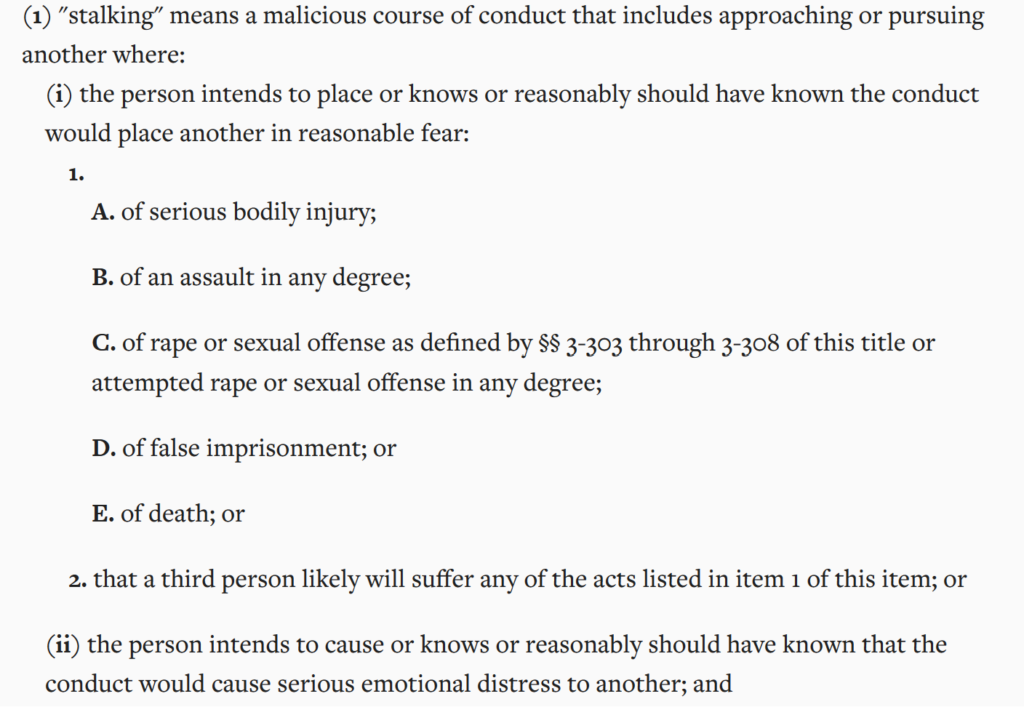Is Doxxing Illegal In Maryland?
Laura Martisiute
Reading time: 5 minutes

Table of Contents
Is doxxing illegal in Maryland? If you’re a resident of the state and are wondering how protected you’d be if someone published your personal information online without your permission – or what would happen if someone used that information to harm you – you’ll find the answers in this guide.
Is Doxxing Illegal in Maryland?
No. The act of doxxing is not illegal in Maryland. This means that someone can publish your information online without your consent and not face a legal penalty.
Doxxing Related Activities That Are Illegal In Maryland
Even though doxxing isn’t illegal in Maryland, there are crimes that go hand-in-hand with doxxing that you should familiarize yourself with as they may come up in doxxing situations.
In Maryland, these include harassment, stalking, misuse of telephone facilities and equipment, and misuse of electronic communication.
Harassment
Behaving in a way that alarms, annoys, or harasses someone after being asked to stop is considered harassment (Maryland Criminal Law Code Section 3-803) in Maryland.

This law doesn’t apply to persons engaging in peaceful activities to express political views or inform others.
In Maryland, harassment is a misdemeanor that comes with imprisonment (up to 90 days) and/or a fine of up to $500. For any subsequent offense, the penalty increases to 180 days imprisonment and/or a fine of up to $1,000.
Stalking
Stalking (Maryland Criminal Law Code Section 3-802), defined in Maryland as putting someone in reasonable fear of serious bodily injury, rape, false imprisonment, or death in such a way that causes severe emotional distress, is a serious crime.

In Maryland, stalking is charged as a misdemeanor, with the perpetrator facing up to five years in jail and/or a fine of up to $5,000.
Notably, Maryland’s legal code states that stalking can take place in person or using electronic means. If you’ve been doxxed and someone is harassing you continually to the point of stalking you online, this law could come into play.
Misuses of telephone facilities and equipment
Using the phone to annoy, harass, or embarrass other people by making inappropriate comments – which can certainly come up if bad actors get ahold of your home or work phone number via doxxing – is charged under Maryland’s Misuse of telephone facilities and equipment law (Maryland Criminal Law Code Section 3-804).

Misusing telephone facilities is a misdemeanor in Maryland that can result in up to three years in jail and/or a $500 fine.
Misuses of electronic communication
Since doxxing is an online activity, a closely related criminal behavior in Maryland is misusing electronic communication.
This law mostly encapsulates protections for minors, including making it a crime to repeatedly contact minors online, publishing images of minors online, or making statements to encourage others to harass a minor online.
However, the law also includes protections against those who use electronic communication to harass, alarm, or annoy another person even after that person has asked them to stop.

Additionally, the law covers making fake online profiles and posing as others in electronic communication.
Those found guilty of misusing electronic communication in Maryland face a misdemeanor with up to a three-year imprisonment and/or a $10,000 fine.
Is Doxxing Illegal at the Federal Level?
Despite the dangers that can come from doxxing, it’s not illegal at the federal level.
Some states, such as California and Illinois, are taking their residents’ protection against doxxing into their own hands as a result, and a growing number of states are considering doxxing laws.
If you live in an area like Maryland, where there are no specific anti-doxxing laws, it becomes especially important to do what you can to minimize the possibility of being doxxed.
While you may not be able to hold someone accountable when they obtain and release your personal information, you can at least limit the amount of information that’s publicly viewable on the internet.
How to Protect Yourself Against Doxxing In Maryland (And Elsewhere)
Your best option to limit the access doxxers have to you is to make yourself as undoxxable as possible.
Doing so means methodically assessing your online footprint and closing gaps that make your personal data vulnerable.
We’ve put together a guide on how to dox yourself, and you can also refer to this list of doxxing tools to get started.
Once you’ve doxxed yourself, you’ll have a clearer idea of what you’ll need to do next. For most people, this will involve:
- Opting out of data brokers. Data brokers are companies that collect public information and compile it into profiles, which are then sold to anyone willing to pay a minimal fee. You’ll likely run into several data broker websites when you dox yourself, and you’ll need to opt out of each one. Furthermore, data brokers refresh their databases when new information is uncovered, meaning you’ll need to opt out of their databases repeatedly. Consider using a data broker removal service like DeleteMe – our privacy experts can handle the opt-out process for you.
- Changing your privacy settings on your social media accounts so that only your friends can see your posts and biographical information.
- Using unique usernames on different platforms to make it harder for doxxers to follow you.
- Being very mindful of what information you share online and with whom.
The less data there is about you on the web, the harder it will be for someone to doxx you. To learn more, read our guide on how to prevent doxxing.
Our privacy advisors:
- Continuously find and remove your sensitive data online
- Stop companies from selling your data – all year long
- Have removed 35M+ records
of personal data from the web
Save 10% on any individual and
family privacy plan
with code: BLOG10
news?
Don’t have the time?
DeleteMe is our premium privacy service that removes you from more than 750 data brokers like Whitepages, Spokeo, BeenVerified, plus many more.
Save 10% on DeleteMe when you use the code BLOG10.
















